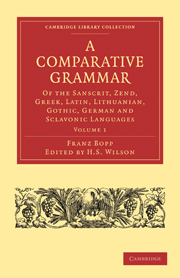OF THE ROOTS
Published online by Cambridge University Press: 04 April 2011
Summary
105. There are in Sanscrit, and the languages which are akin to it, two classes of roots: from the one, which is by far the more numerous, spring verbs, and nouns (substantives and adjectives) which stand in fraternal connection with the verbs, not in the relation of descent from them, not begotten by them, but sprung from the same shoot with them. We term them, nevertheless, for the sake of distinction, and according to prevailing custom, Verbal Roots; and the verb, too, stands in close formal connection with them, because from many roots each person of the present is formed by simply adding the requisite personal termination. From the second class spring pronouns, all original prepositions, conjunctions, and particles: we name them Pronominal Roots, because they all express a pronominal idea, which, in the prepositions, conjunctions, and particles, lies more or less concealed. No simple pronouns can be carried back, either according to their meaning or their form, to any thing more general, but their declension-theme (or inflective base) is at the same time their root. The Indian Grammarians, however, derive all words, the pronouns included from verbal roots, although the majority of pronominal bases, even in a formal respect, are opposed to such a derivation, because they, for the most part, end with a: one, indeed, consists simply of a.
- Type
- Chapter
- Information
- A Comparative Grammar of the Sanscrit, Zend, Greek, Latin, Lithuanian, Gothic, German, and Sclavonic Languages , pp. 96 - 123Publisher: Cambridge University PressPrint publication year: 2010First published in: 1843



